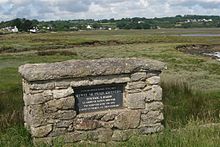Hywel ab Owain Gwynedd
| Hywel ab Owain Gwynedd | |
|---|---|
| Prince of Gwynedd | |

Hywel ab Owain memorial from Pentraeth, Anglesey
|
|
| King of Gwynedd | |
| Reign | 1170 |
| Predecessor | Owain Gwynedd |
| Successor | Dafydd ab Owain Gwynedd |
| Born | c. 1120 Gwynedd, Wales? |
| Died | 1170 Pentraeth, Ynys Mon, Wales |
| House | House of Aberffraw |
| Father | Owain Gwynedd |
| Mother | Ffynod Wyddeles |
Hywel ab Owain Gwynedd (died 1170), Wales Prince of Gwynedd in 1170, was a Welsh poet and military leader. Hywel was the son of Owain Gwynedd, prince of Gwynedd, and an Irishwoman named Pyfog. In recognition of this, he was also known as Hywel ap Gwyddeles (Hywel son of the Irishwoman). Hywel was also known as the Poet Prince for his bardic skills.
Hywel's father Owain and uncle Cadwaladr came to blows in 1143 when Cadwaladr was implicated in the murder of Prince Anarawd ap Gruffydd of Deheubarth, Owain's ally and future son-in-law, on the eve of Anarawd's wedding to Owain's daughter. Owain followed a diplomatic policy of binding other Welsh rulers to Gwynedd through dynastic marriages, and Cadwaladr's border dispute and murder of Anarawd threatened Owain's efforts and credibility.
As ruler of Gwynedd, Owain stripped Cadwaladr of his lands, and dispatched Hywel to Ceredigion where he burned Cadwaladr's castle at Aberystwyth. Cadwaladr fled to Ireland and hired a Norse fleet from Dublin, bringing the fleet to Abermenai to compel Owain to reinstate him. Taking advantage of the brotherly strife, and perhaps with the tacit understanding of Cadwaladr, the marcher lords mounted incursions into Wales. Realizing the wider ramifications of the war before him, Owain came to terms and reconciled, with Cadwaladr restored to his lands. Peace between the brothers held until 1147, when an unrecorded event occurred which led Owain's sons Hywel and Cynan to drive Cadwaladr out of Meirionydd and Ceredigion, with Cadwaladr retreating to Môn. Again an accord was reached, with Cadwaladr retaining Aberffraw until a more serious breach occurred in 1153, when he was forced into exile in England, where his wife was the sister of Gilbert de Clare, 2nd Earl of Hertford, and the niece of Ranulph de Gernon, 2nd Earl of Chester.
In 1146, news reached Prince Owain ap Cynan of Gwynedd that his favoured eldest son and heir, the elding, Rhun, died. Owain was overcome with grief, falling into a deep melancholy from which none could console him, until news reached him that Mold castle in Tegeingl (Flintshire) had fallen to Gwynedd, "[reminding Owain] that he had still a country for which to live," wrote historian Sir John Edward Lloyd.
...
Wikipedia
